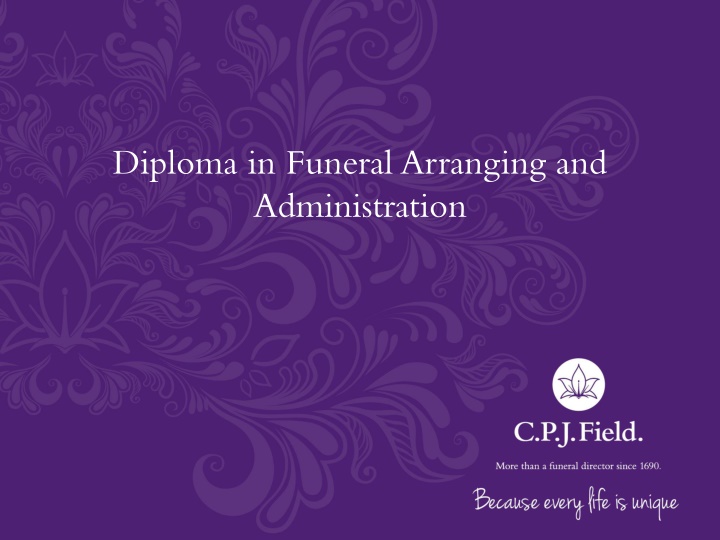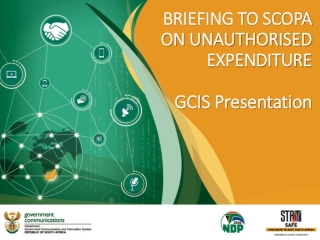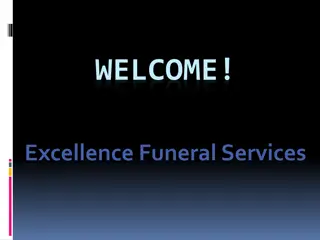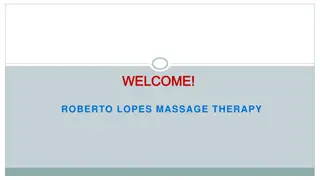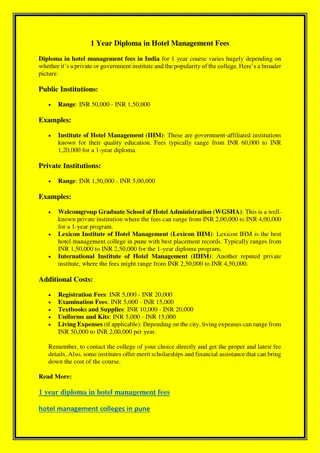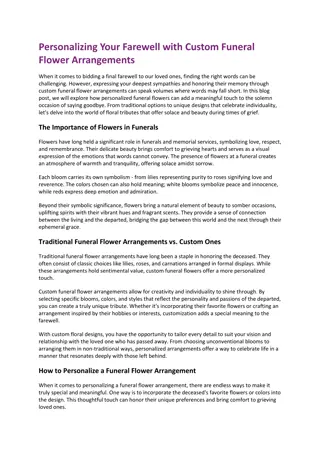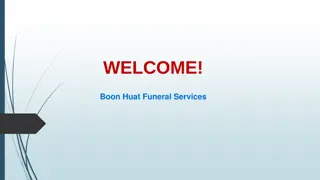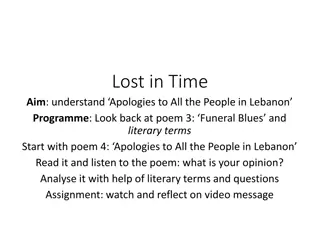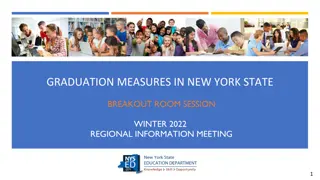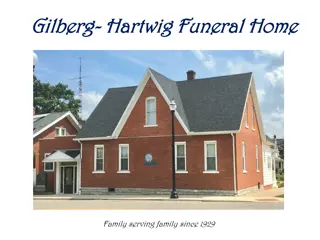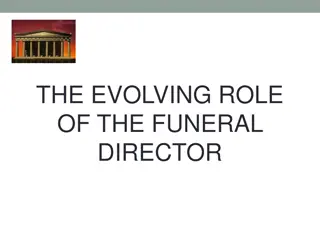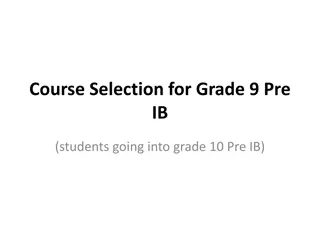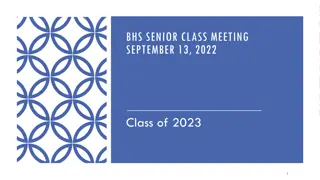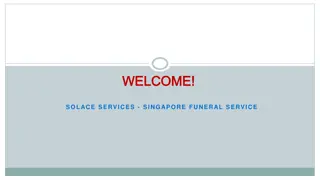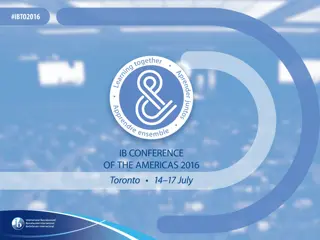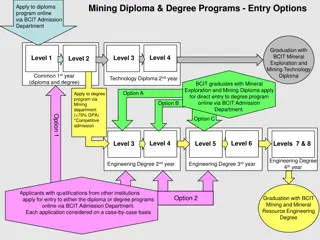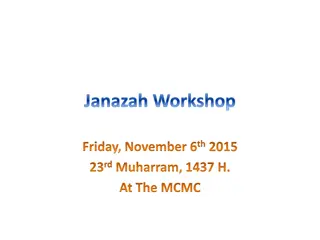Funeral Arranging and Administration Diploma Course Overview
This Funeral Arranging and Administration Diploma course provides a comprehensive curriculum covering topics such as understanding bereavement, client care in the funeral service, communication skills, legislation, health and safety, and more. Led by experienced tutor Peter Linford, the course includes 14 units across 5 modules, reflective logs, tutor-set assignments, exams, and practical training. Connect with Peter for more information and enrollment details.
Download Presentation

Please find below an Image/Link to download the presentation.
The content on the website is provided AS IS for your information and personal use only. It may not be sold, licensed, or shared on other websites without obtaining consent from the author.If you encounter any issues during the download, it is possible that the publisher has removed the file from their server.
You are allowed to download the files provided on this website for personal or commercial use, subject to the condition that they are used lawfully. All files are the property of their respective owners.
The content on the website is provided AS IS for your information and personal use only. It may not be sold, licensed, or shared on other websites without obtaining consent from the author.
E N D
Presentation Transcript
Diploma in Funeral Arranging and Administration
Welcome to the course! Today we will Meet each other Meet the tutor Look at the syllabus Look at the coursework Learn to reflect Be excited Not be scared (I hope)
Peter Linford MA DipFD Chauffer/Bearer Lancaster & Morecambe Coop 1995-1998 Trainee Funeral Director Heritage & Sons, Winslow 1999-2003 Funeral Director Heritage & Sons, Aylesbury 2003-2013 Funeral Director Heritage & Sons, Wendover 2013-2017 Head of Training CPJ Field & Co. Ltd. from 2013
How to contact me Email: peter.linford@cpjfield.co.uk Phone: 01296 326113 Mobile/WhatsApp: 07970 338779 Skype: ttfc.peter.linford
Course Outline 14 Units across 5 Modules revision sessions and mock exams 5 Individual Learning Reports (externally moderated) 5 Reflective Logs (externally moderated) Tutor-set assignments for each unit marked online or by me (no moderation) A final written exam (1 hrs) A final oral exam (1 hrs)
Module 1: Introduction to Funeral Arranging and Administration Unit 1: Understanding Bereavement and Grief Unit 2: Client Care in the Funeral Service Unit 3: Communicating with clients within the funeral service
Module 2: First Call, including Care and Presentation of the Deceased Unit 4: Responding to the initial notification of death Unit 5: Care and Presentation of the Deceased
Module 3: Legislation Unit 6: Health and Safety for Funeral Arrangers Unit 7: Registration of Death and Coroners procedures Unit 8: Human Cremation: Law & Practice Unit 9: Human Burial : Law & Practice
Module 4: Arranging the Funeral Unit 10: Understanding funeral rites Unit 11: Arranging a funeral Unit 12: Arranging a funeral for a child and baby Unit 13: Office Practice and Administration within the funeral service
Module 5: Finance Unit 14: Understanding client liability, entitlement and consumer regulations within the funeral service
Work after each of the 15 units An online quiz OR A short written exercise
Coursework for each Module Individual Learning Report 2000 words on a set topic related to the Module What happened and what did you do? Pass mark = 60% Reflective Log 750 words on a topic of your choice (but taken from your Report) How did you feel about it? Pass/Fail
Marking scheme A: 90%-100% B: 75%-89% C: 60%-74% D: 40%-59% E: 39% and below Penalties will be applied for work submitted late: 10%: up to seven days late 20% up to fourteen days late Fail: fifteen or more days late7 maximum of 60% possible when submitted
Report 1 Citing current theories of loss, write a report that commences with a brief summary of the circumstances of loss, before indicating why and how you have adapted your arrangement interview style and how effective this has been. Include examples of your listening, questioning and responding skills or any other techniques you have used.
Report 5 Find out the policies and procedures regarding the payment of funerals for the organisation in which you work. This should include dealing with: DWP funerals pre-payment payment by instalment invoicing debt management and non-payment client terms and conditions receipting and record keeping dealing with client who have limited funds price flexibility telephone quotes
Report 2 Part 1: Describe two first call conversations you have dealt with. Outline the information received from and given to the client along with the action you took to facilitate the deceased being brought into your care. Part 2: Attend and/or participate on two occasions when you have brought the deceased into your care. One must be from a private house. Describe the interaction with the family and colleagues, and the actions taken from leaving your premises to your return. Part 3: Observe a deceased being prepared for the chapel of rest/viewing facility. This may or may not involve embalming. Describe the procedure including identification, preparation and the maintenance of dignity of the deceased, health and safety issues and manual handling. Part 4 Describe one example of a viewing and the procedure for taking the family into the Chapel of rest.
Report 3 Part 1 Write a report drawing from the experience of two funerals you have arranged or observed. The first must be where a death has been registered without reference to the coroner/procurator fiscal; the second where the coroner/procurator fiscal has been involved. Describe the procedure and certification involved (including that issued for burial and cremation, statutory and non-statutory documentation) and relate this to your understanding gained from the study of Module 3 Units 3,4, & 5. Part 2 Write a report after attending a funeral at a crematorium and also after attending a burial. Describe the facilities at the crematorium and burial ground, including the chapel/ceremony hall, committal arrangements and general layout and facilities.
Report 4 Write a report based on three funerals you have arranged or observed (one could be a child s funeral). After giving a brief overview of the arrangement, outline the range of options offered to the client regarding personalisation, participation, ritual, music, facilities, etc. Indicate how these options were discussed with the family including why you made them and advice you have obtained from others along with any challenges or difficulties.
Methods of reflection: Dewey A problem is identified that we feel We interpret the problem to understand it better We work out a possible solution We examine our proposed solution carefully We test our solution in practice
